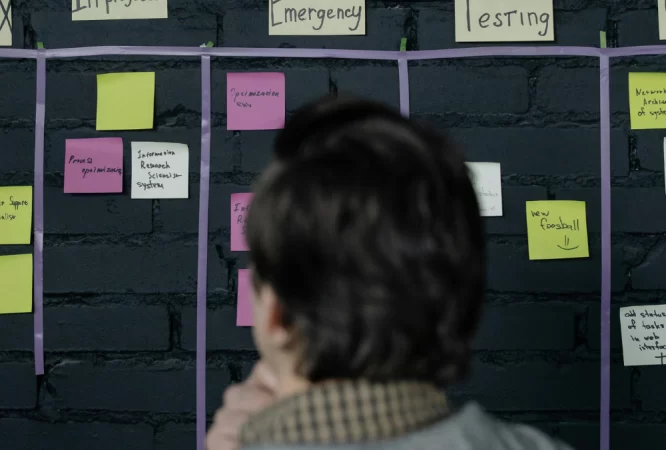Agile Delivery Manager

Career Pathways
Senior Delivery Manager, Head of Delivery, Agile Coach, Enterprise Agile Coach, Product Manager, Product Director, Program Manager, Portfolio Manager, Chief Operating Officer (COO), Operations Lead, Technical Delivery Manager, Engineering Manager, Change Manager, Transformation Lead, Agile Consultant, and Freelance Agile Coach
*Disclaimer: Success depends on individual effort and dedication. This is a rigorous bootcamp, and students are expected to fully commit to the challenges in order to become proficient coders.
Course Overview
The difference between a Agile Delivery Manager and a Scrum Master therefore lies mainly in the Scope and in the responsibility. An Agile Delivery Manager works at a higher level and oversees multiple teams or projects, while a Scrum Master works at a lower level and focuses on one team or project.
Also, while the traditional Project Manager role focuses on planning and completing projects within scope, time, and budget constraints, the Agile Delivery Manager role is all about continuous improvement and innovation, focusing on collaboration and Agile practices and focus on the day-to-day flow of their delivery team, working to improve processes.
These are what to expect from the course:
- Introduction to Agile Delivery Management
- Agile Methodologies Overview (Scrum, Kanban, Lean)
- Agile Manifesto: Principles and Values
- Role and Responsibilities of an Agile Delivery Manager
- Scrum Framework: Roles, Events, and Artifacts
- Kanban Methodology and Visual Workflow
- Lean Thinking and Continuous Improvement
- Agile Project Scoping and Planning
- Agile Delivery Tools (Jira, Trello, Asana, etc.)
- Agile Metrics and Reporting Techniques
- Servant Leadership and Agile Communication
- Building and Leading High-Performing Teams
- Scaling Agile in Large Organisations (SAFe, LeSS)
- Managing Agile Transformation and Change
- Real-World Agile Case Studies and Best Practices
- Final Project: Agile Delivery Simulation and Presentation
Schedule
| Day | Activity | Time |
|---|---|---|
| Saturday | Agile Delivery Manager Training | 8:00pm UK Time 8:00pm WAT |
| Monday | Sprint Review | 7:00pm – 10:00pm UK Time 7:00pm – 10:00pm WAT |
| Tuesday | Sprint Retro / Sprint Planning | 7:00pm – 10:00pm UK Time 7:00pm – 10:00pm WAT |
What You Will Learn
The core principles and values behind Agile methodologies
How to manage and lead Agile teams effectively
The role of an Agile Delivery Manager in project execution
How to apply Scrum, Kanban, and Lean frameworks in real projects
Planning and managing sprints, reviews, and retrospectives
Using tools like Jira, Trello, and Asana for Agile delivery
Tracking progress with Agile metrics and reporting techniques
Building high-performing, self-organising Agile teams
Effective communication and servant leadership practices
Strategies for scaling Agile across multiple teams or organisations
How to manage Agile transformations and organisational change
Real-world application through practical case studies and projects
Feedback from Past Learners

Ola Balogun
"I have taken a few courses and I must say this one is exemplary. Industry expert coaches tutored and helped me to be ready and pivot to a new digital role. I attended training sessions with practical and hands-on live change projects.
The modelling of the training conditioned the learning environment to industry standard. It totally exceeded my expectations.
I'd recommend the course to anyone who is considering moving to tech or trying to gain new tech skills."

Pelumi Okunade
"DCA is a very great learning platform. I’m currently enrolled in their Business Analysis training programme and it has been a wonderful experience so far. I have learnt so many new skills and this experience has even encouraged me to want to learn more about product management and product development. I’m happy I enrolled for this programme."

Babajide Jolaolu-Kehinde
"Fantastic Trainers/Coaches & opportunities for work experience for graduating students from simulation.
"DCA also support with free interview prep class. Candidates who joins the WX team are supported with reference when they get their permanent offers.
Theoretical & Practical hands on style/framework. Great place to be!"

Kemi Adekeye
"Enrolling with DCA has been beyond rewarding for me. Being someone who transitioned into tech from a totally unrelated field, I can now boast of the confidence, skills and expertise needed to excel in this field since enrolling for the Scrum Master and Agile Delivery Manager training at DCA. The courses delivery from the various coaches who are always available to provide learning support, hands-on training on various collaborative tools and learning resources made available to students to study at their own time, are a few benefits of enrolling on DCA. I would recommend DCA again and again. Many thanks to DCA!!!"
Webinars & Taster Sessions
Certificate

- Comprehensive Agile Methodologies
- Hands-on Tools Training
- Real-World Case Studies for practical learning
- Agile Metrics & Reporting techniques
- Leadership Development with a focus on servant leadership
- Sprint Planning & Management workshops
- Collaboration Skills for team and stakeholder management
- Emphasis on Communication strategies within Agile teams
- Agile Transformation Strategies for scaling across organisations
- Aspiring Agile Delivery Managers
- Project Managers transitioning to Agile
- Scrum Masters
- Product Owners
- Business Analysts
- Software Developers and Engineers
- IT Professionals looking to shift to Agile roles
- Team Leaders and Department Heads
- Operations Managers
- Professionals in Product and Service Delivery
- Entrepreneurs and Startups looking to implement Agile
- Individuals pursuing career growth in Agile methodologies
- Basic Project Management Knowledge
- Willingness to Embrace Change
- Team Collaboration Skills
- Basic Understanding of Software Development (for tech roles)
- Commitment to Continuous Learning
- Critical Thinking and Problem-Solving Skills
- Familiarity with Tools (Optional but Helpful)
- Familiarity with Tools (Optional but Helpful)
- Curiosity and a Growth Mindset
You might be interested in
-
Private 1-1
-
All levels
-
0 Students
-
50 lessons
-
Private 1-1
-
All levels
-
0 Students
-
50 lessons
-
Private 1-1
-
All levels
-
0 Students
-
50 lessons
-
In-person class
-
All levels
-
0 Students
-
50 lessons
Need Us To Send You Every Insight,
Career Tips & Special Offer?
We've got you. Just Tell Us Where to Drop It
Get in touch
Call Us/WhatsApp:
Address
Quick Links
- Copyright © 2025 DCA. All Rights Reserved || Designed By Cleave Creative Solutions




